Navigating the Shift: How The Evolution To An Employer-Driven Market is Redefining Recruitment
Capacita Consultants
8/15/20243 min read
As we are about to enter the final quarter of 2024, it’s worth discussing that the recruitment landscape has undergone significant changes in recent years, and the first half of 2024 is no exception.
The shift from a very candidate-driven market (which characterized much of the past decade), to a more employer-driven environment, is reshaping how businesses approach talent acquisition.
Let’s examine how companies are responding to this new reality.
One of the primary drivers behind the shift to an employer-driven recruitment landscape is the global economic uncertainty that has persisted since the COVID-19 pandemic. While many economies have shown signs of recovery, the volatility of markets, inflation, and geopolitical tensions have made companies more cautious in their hiring practices:
An increased competition for jobs: As companies tighten their belts and reduce headcount, the number of available positions has decreased, leading to increased competition among job seekers.
More employer leverage: With more candidates vying for fewer positions, employers have gained more leverage in the recruitment process, allowing them to be more selective in their hiring decisions.
More focus on cost-efficiency: Economic uncertainty has also driven companies to prioritize cost-efficiency, leading them to streamline their recruitment processes and focus on candidates who can deliver immediate value.
Technological advancements: This has also played a crucial role in the shift towards an employer-driven recruitment landscape. AI, machine learning, and data analytics have empowered employers to optimize their recruitment processes, making them more efficient and targeted.
Composition and expectations of the workforce: Factors such as the rise of remote work, the growing gig economy, and changing employee priorities have reshaped how companies approach talent acquisition.
How Companies Are Responding
Streamlining recruitment processes: In an employer-driven market, companies are focusing on streamlining their recruitment processes to attract and hire top talent more efficiently. This includes leveraging technology, refining job descriptions, and enhancing the candidate experience.
Focusing on employer branding: In a competitive job market, employer branding has become a critical component of recruitment strategy. Companies are investing in their brand to position themselves as employers of choice, even in an employer-driven landscape.
Prioritizing internal mobility and talent development: As the recruitment landscape becomes more employer-driven, companies are increasingly focusing on internal mobility and talent development. By nurturing existing employees and providing them with growth opportunities, employers can reduce their reliance on external hiring and build a more resilient workforce.
Adapting to remote and hybrid work models: The shift to remote and hybrid work models has added a new dimension to recruitment strategies. Companies are adapting their recruitment processes to identify candidates who are well-suited for these work environments.
What It Means For Employers And Job Seekers
While an employer-driven recruitment landscape offers companies greater control over their hiring processes, it also presents new challenges. Employers must balance the need for efficiency with the importance of maintaining a strong employer brand and providing a positive candidate experience:
Selective hiring: Employers can afford to be more selective in their hiring decisions, but they must ensure that they are not overlooking qualified candidates who may not fit the traditional mold.
Maintaining employer brand: Even in a market where employers have the upper hand, maintaining a strong employer brand is crucial for attracting top talent and retaining employees.
Long-Term Talent Strategies: Companies must focus on long-term talent strategies, including internal mobility, talent development, and succession planning, to build a resilient workforce.
For job seekers, the shift to an employer-driven market means that they must be more strategic in their job search efforts. Candidates need to be prepared to compete for fewer opportunities and demonstrate their value to potential employers more effectively:
Increased competition: Job seekers will face increased competition for roles, making it essential to stand out through tailored resumes, strong personal branding, and a proactive approach to networking.
Emphasis on skills and experience: Employers are placing greater emphasis on skills and experience, so job seekers should focus on developing and showcasing the competencies that are most in demand.
Adaptability and flexibility: Candidates who demonstrate adaptability and flexibility, particularly in terms of remote and hybrid work, will be better positioned to succeed in an employer-driven market.
Recruitment Firms: Adapting To The Shift
The industry has continuously refined its strategies to meet the changing needs of employers while continuing to provide value to job seekers:
Evolving services: Recruitment firms are expanding their service offerings to include employer branding, talent development, and succession planning, in addition to traditional recruitment services.
Focus on quality over quantity: Recruitment firms are focusing on delivering high-quality candidates who meet the specific needs of employers, rather than simply filling vacancies.
Partnerships with employers: Building strong partnerships with employers is more important than ever, as recruitment firms need to align their strategies with the long-term talent goals of their clients.
As it stands, the future of recruitment will be defined by the continued integration of AI, data/analytics, and the development of resilient talent strategies that can withstand the uncertainties of the business landscape.
(If you are a job seeker or an enterprise seeking expert guidance on how to navigate this changing landscape, reach out to us at Capacita Consultants today.)
Connect With Us


